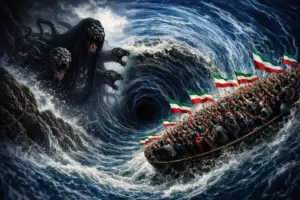 Statement of the Political-Executive Committee of the People’s Fedaian Organization of Iran (Majority)
Statement of the Political-Executive Committee of the People’s Fedaian Organization of Iran (Majority)
On Monday evening, June 23, the President of the United States announced in an official message the ceasefire agreement between Iran and Israel; news that quickly made the rounds in the media and on the global political scene. Our organization expresses its satisfaction with this cessation of hostilities and hopes that the ceasefire will lead to a lasting peace. The twelve days of this war, which targeted large residential areas in both countries, claimed hundreds of lives and caused significant damage to infrastructure. Despite this heavy toll, the end of the conflict is considered an important step towards maintaining stability in the region.
However, this ceasefire does not simply mark the end of a direct conflict, but the beginning of a more complex and sensitive phase, focused on political, security, and diplomatic pressure at multiple levels. From the start of the conflict, our organization rightly and firmly condemned Israel’s military action as an attack without foundation or provocation, in total contradiction with the principles of international rights. An action that violated Iran’s national sovereignty and seriously threatened the stability of the region.
The Israeli military operations, codenamed “The Lion’s Awakening”, began with the stated objective of regime change in Iran, but they failed in the early days in the face of fierce Iranian resistance and targeted missile retaliation. Israel’s misjudgments of the Iranian social and political climate were the main reason for this military adventure. Iranian public opinion was expected to remain passive or even join the attack; but the public reaction, from supporters to critics of the regime, was unprecedented and united. Iranian public opinion clearly opposed this aggression. In contrast, Iran clearly demonstrated its deterrence by firing missiles at vital infrastructure in Israel, inflicting a major shock on the fragile Netanyahu government, still struggling with the heavy consequences of the Gaza war and global outrage and anger over the civilian casualties.
Faced with successive failures, the Israeli government attempted to shift the balance of power by involving the United States and thus interrupting nuclear negotiations (between Iran and the United States of America, editor’s note). American airstrikes, with Israeli participation, targeted Iranian nuclear facilities, including Fordow, Natanz, and Isfahan, using super-heavy weapons and missiles launched from submarines in the Indian Ocean. Despite this large-scale and costly operation, American military analysts asserted that these attacks failed to completely destroy key facilities. The Iranian response, including an attack on the (American) Al-Udeidah airbase in Qatar, coordinated with the Qatari government, once again demonstrated that Iran still possessed the capacity to retaliate and that its military capability, despite the damage, had been preserved.
Meanwhile, President Trump, together with the Emir of Qatar, played a key role in negotiating the ceasefire. Intensive and secret negotiations in Doha, attended by representatives of the three countries, resulted in a temporary agreement, without which the war could have escalated, and other regional actors would have entered the fray. The fact that the United States announced the ceasefire not as a neutral mediator, but as a party to the conflict, was in itself a sign of the complexity of the situation and the fragility of the existing balance.
The twelve days of war also brought unexpected results. Iran’s internal cohesion was preserved, despite chronic economic crises and social divisions. No signs of rebellion or collaboration with the enemy were observed in border areas or among ethnic minorities. Peace and ceasefire advocacy protests in various countries, Iranian immigrants’ support for the right to national defense, and the unanimity of independent political forces against war and foreign intervention presented a picture beyond common stereotypes. Many political opponents, prevented from returning home for years, openly supported the Iranian people against military aggression.
However, a phase is now beginning that could prove far more difficult than war. International pressure is intensifying for Iran to return to the negotiating table immediately, with emphasis on its missile program and regional influence. European leaders are insisting on the need to include new topics in the nuclear negotiations. However, the country’s infrastructure is damaged, the army is under pressure, and society is experiencing a post-war psychological crisis. Entering into negotiations under such circumstances, without setting red lines and relying on internal unity and cohesion, would amount to accepting a political structure imposed from outside.
In this regard, the bitter experience of negotiations conducted by Western countries with Iraq and Libya should serve as a warning. In both cases, the negotiations did not lead to lasting peace, but to the weakening of the governance structure, military occupation, and ultimately the collapse of the country. These examples show that in the absence of a balance of power and social support, negotiations can become a tool for foreign powers to shape a country’s political future.
At the same time, it is important to note that, under the weight of crippling sanctions, the Iranian armed forces have been forced to develop their own defense industries, including missile and drone production. Calls to limit these capabilities without lifting sanctions and without opening the way for legitimate economic and defense cooperation constitute a kind of direct interference in the country’s right to national defense. Our response to these expectations is a call for the lifting of sanctions, Iran’s return to global markets, and the creation of regional security agreements based on economic cooperation; in such a context, the need for significant military spending would naturally diminish.
To overcome this critical hurdle, the Islamic Republic must engage in introspection before acting on the international stage. Restoring public trust by opening political, social, and civic space is a vital necessity. Releasing prisoners of conscience, ending the incarceration of political figures, strengthening labor and civic institutions, and giving the people a platform to participate in the country’s reconstruction are not concessions to the opposition, but rather a prerequisite for survival and internal stability. No negotiation in the world without genuine social support will be legitimate and sustainable. It is therefore essential to remain vigilant against the patterns imposed by the past and avoid repeating the experiences that led to human and political catastrophes.
While expressing our satisfaction with the ceasefire, we caution against the bitter memory of the end of the Iran-Iraq War and the tragedies that followed the adoption of Resolution 598, including the execution of thousands of political prisoners in the 1980s, which remains vivid in the nation’s collective memory. Our concern about the government’s possible treatment of dissidents and political activists after the end of the war is very acute, especially in light of the constant threats from extremist factions within and around the government. At the same time, it is essential to understand that the infiltration of enemy intelligence services and the assassination of the country’s military commanders would have been impossible without the role of certain internal factors and networks of influence. Fair treatment of these cases must be accompanied by a clear distinction from the indiscriminate security treatment of political critics.
The Iranian people resisted military aggression. Those in power must now hear their legitimate demands for human respect and justice and stand firm to listen to them. Iran’s future relies not on foreign military powers, but on independence in decision-making, national unity and official recognition of the people as the main owners of the country.
We want peace, but an honorable peace. We welcome negotiations, but not from a position of weakness. Only by relying on national will and internal dialogue can we overcome this crisis with pride and stability.
Wednesday, June 25, 2025
Political-Executive Committee of the People’s Fedaian Organization of Iran (Majority)









